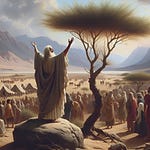Chapter Summary
Has God ever taught you the importance of waiting for His time?
In Exodus 2, God’s appointed servant learns not that God did not want to use him, but that the time had not yet arrived.
Commentary
vv. 1–10 - Amidst an awful period of persecution in which it is likely that many infant Hebrew males were killed, God unfolds His purpose through a husband and wife both from the tribe of Levi. They already have two children by the time of Pharaoh’s decree to drown all the newborn males, and when the third is born, his physical beauty is such that his mother, carried by faith, is convinced God has a purpose for him, which seems to be implied by the record here and in Hebrews 11:23. Perhaps because Pharaoh’s officers did periodic searches, after three months, the child was put in a little vessel made of papyrus and placed at the edge of the river where it would not be taken downstream. Although we are not given details of what Jochebed hoped might happen, it appears likely to me that Pharaoh’s daughter washed herself at the same time and location and that would have been known to those living in the area. Which means Jochebed intended her to find her son, and therefore believed her character was such that she might defy her father and protect rather than kill the child. A sister of the infant, possibly Miriam, is watching, and is able to approach the Egyptian princess and suggest she fetch a Hebrew nurse for the child. Unknown to the princess, she finds her mother, who is then paid for a service she would have gladly performed for free. The princess then adopts the boy, names him Moses, and as Stephen reveals, he was “learned in all the wisdom of the Egyptians, and was mighty in words and in deeds” (Acts 7:22).
vv. 11–22 - the record then skips 40 years, to reveal to us the reason Moses ended up having to leave Egypt for four decades. Moses knew he was a Hebrew and at some point he needed to make a choice whether to accept his role in the royal household, or help his own people. In the language of Hebrews 11, he chose “to suffer affliction with the people of God… esteeming the reproach of Christ greater riches than the treasures in Egypt” (Hebrews 11:24–26). This conscious choice to reject perhaps the very throne of Egypt, and align with those from whom the promised seed would come, seems to be driven by a sense of divine calling. Stephen reveals in Acts 7, “And when he was full forty years old, it came into his heart to visit his brethren the children of Israel. And seeing one of them suffer wrong, he defended him, and avenged him that was oppressed, and smote the Egyptian: For he supposed his brethren would have understood how that God by his hand would deliver them: but they understood not” (Acts 7:23-25). The fact that the Hebrews didn’t understand his calling is evident the next day when Moses tries to be a peacemaker between two fighting Hebrews. One responds, “Who made thee a prince and a judge over us? intendest thou to kill me, as thou killedst the Egyptian?” This drives Moses into exile, where he ends up marrying the daughter of a Midianite priest. The Midianites descended from Abraham by Keturah (Gen. 25:2), and it is likely this family had retained a knowledge of the gospel, but Moses still feels like a stranger, which is reflected in the name of their son, Gershom, which means “stranger.”
vv. 23–25 - the final few verses cover another 40 years. There is another new Pharaoh which may have raised the hopes of the Hebrews. But the bondage continues. As a result, the children of Israel begin to cry out to the God of their fathers for deliverance.
Application
Faith does not require us to ignore practical realities. Some might argue that Amram and Jochebed should have trusted God rather than hide Moses. But even our Savior, who knew He would be preserved until His hour was come, at times withdrew from those who sought His life (Luke 4:30; John 8:59). Do not fall for the allure of a mystical obedience when a practical obedience glorifies God.
God’s hand is upon the elect in their unregenerate state. It is impossible to miss God’s providence as He governs the details of the early life of Moses. Although we may not be appointed to such lofty service as Moses, all should recognize God’s sovereign governance of affairs before we were ever conscious of it. If you are a Christian, allow no experience to create resentment around your early years. Moses was separated from his family to live in the household of their enemy, but God had a purpose. The same is true in your life and mine.
Civil authorities should be defied when their decrees are contrary to God’s Word. We are to obey them that have the rule over us. Even foolish laws must be submitted to. But laws which ask us to rebel against God’s explicit commands must be disobeyed. However, in the cases of Moses’ parents, Daniel praying, and the apostles continuing to preach, these were acts of faith, not carnal rebellion. Make sure if you are ever tempted to rebel against authorities that you are being commanded not to an inconvenience, but to sin.
Men are inclined to commit the sins of their fathers. Moses, a Levite, does as his forefather did when in Levi’s anger he slew a man (Gen. 49:6). Most commentators try to justify Moses killing the Egyptian, especially from Acts 7:24. Jewish tradition, in an attempt to justify the act, believes Moses killed the Egyptian with a prophetic word. Was this lawful interposition or self-defense? It is not explicit, and since Moses had time to look around before killing him, it appears like the act of a vigilante. And the Hebrews do not support what he did. It is also worth noting that when Moses finally delivers the Hebrews, he never has to lift a weapon against any of them. Whatever the case, the lesson here appears to be that Moses sought to save the Hebrews by works, when God saves by grace. I conclude that Moses’ response to sin was an overreaction, just as Levi had done before him. May God deliver you and me from the sins of our fathers.
God gives hope of a deliverer through types. Moses was called by God to exemplify one of the most significant types of the Lord Jesus, functioning as a deliverer, lawgiver, and mediator. In this chapter, we see how, just like Christ, Moses faced immediate danger at his birth, was not ashamed to identify with his people and called them brethren, yet when he came unto his own, his own received him not. Moses, like Christ, also went about doing good, seeking to exercise justice for the Hebrews, between the Hebrews, and on behalf of Jethro’s (here called Reuel) daughters. Moses, like Christ, had an affection for the oppressed, as should we.
God brings life out of death. The command of Pharaoh was that every infant male should be drowned in the river. When Jochebed places Moses in the river, she places him in the location of death, and yet from there he is drawn out in life to eventually bring salvation to his people. Such is true of Christ, who was placed on a cruel cross designed for death, and yet was resurrected into an endless life whereby He was empowered to grant salvation to His people. Boys and girls, have you been delivered from death? Are you saved? Are you born again?
“When God is about to give a man a drink of the cup of salvation, He often first puts his taste right by washing out his mouth with a draught of bitters to take away the flavor of the accursed sweets of sin.” — Charles Spurgeon











